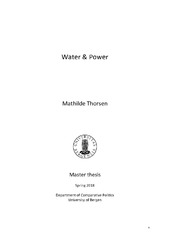| dc.description.abstract | In this thesis, I attempt to explain the development of the international human right to water, and how this has affected opportunities for those that have their rights violated. As the right to water was elevated to an independent human right in 2010, some mechanisms were created to monitor and protect the human right to water. One of the main tools for monitoring the right is the establishment of a Special Rapporteur on Safe Drinking Water and Sanitation. This thesis applied a theoretical framework based on social mobilization and lawfare to investigate how the development of the right has affected opportunities for those that have their rights violated in India. In order to investigate this the thesis is based on the research question: “Has the elevation of the right to water to an independent human right, strengthened opportunities for those that have their rights violated in India?” Using a theoretical framework of social and legal mobilization and lawfare, three hypotheses were developed. The first hypothesis is focused the development of the human right to water in relation to social mobilization. The second hypothesis focused on the use of rights based language, following the adoption of the resolution on the right to water. The last hypothesis specifically focuses on the legal and political opportunities for people that have their rights violated. This thesis seeks to explore if we can see a change in opportunity structures following the elevation of the right to water to a human right. The thesis utilizes the method of process tracing and in-detail description, to explore these hypotheses. The findings indicate that there have been changes to the opportunities for people that have their rights violated in India, especially through the Special Procedures and Universal Periodic Review. The elevation of the right to water to an independent human right has opened up legal opportunities to some extent. However, considering where the right to water stand in a strict legal sense, the Resolution is not legally binding upon states. Thus, the realization of the right to water is dependent on the collaboration of state parties. Social mobilization around water rights in India existed before the adoption of the resolution elevating the right to a human right. The court system in India and cases of public interest litigation has opened up legal opportunities for those that have their rights violated. The right to water stands strong in the Indian legal system, compared to other countries. The right to water is progressive in India, even if India is the country in the world with most people suffering from lack of safe water services. | en_US |
